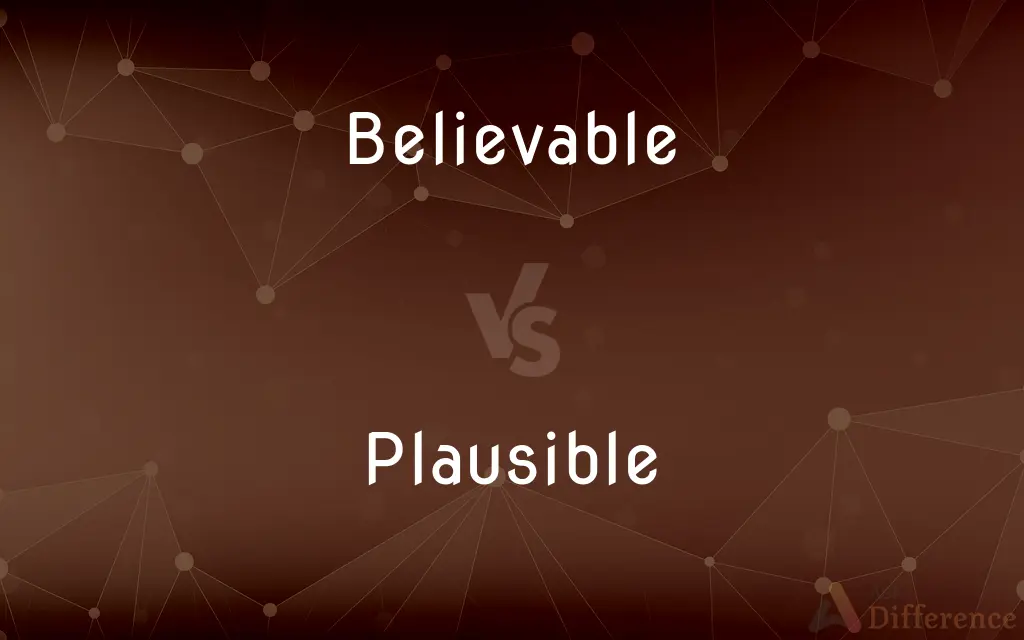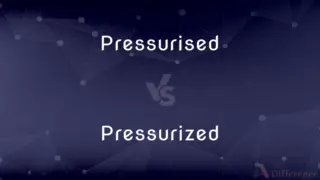Believable vs. Plausible — What's the Difference?
By Tayyaba Rehman — Updated on October 28, 2023
Believable refers to something that is readily accepted as true or credible, while Plausible refers to something that seems likely but may or may not be true.

Difference Between Believable and Plausible
Table of Contents
ADVERTISEMENT
Key Differences
"Believable" and "Plausible" are often used interchangeably, but they carry distinct nuances. Believable tends to emphasize the acceptance of truth or credibility by the receiver, suggesting that something appears true or trustworthy to the person who hears or sees it. On the other hand, Plausible is less about acceptance and more about the appearance of likelihood or reasonableness. Something may seem plausible without necessarily being believed.
Both Believable and Plausible pertain to how we perceive and process information. If someone presents a story that aligns well with our existing knowledge or experiences, we might consider it believable. However, if a story doesn't align perfectly but still makes logical sense, it's plausible. It doesn’t mean we believe it, but it seems possible.
Believable leans more towards an emotional or subjective response. For instance, a testimony might be considered believable if it resonates emotionally with the listener. Plausible, in contrast, often stems from a logical or objective evaluation. A scientific hypothesis might be plausible based on the data presented, regardless of one's feelings about it.
In essence, Believable carries a stronger assurance of truth, often rooted in personal conviction or trust. Plausible, meanwhile, doesn’t assert truth but rather the possibility or appearance of truth. It suggests feasibility more than certainty.
Comparison Chart
Rooted In
Emotional or subjective response
Logical or objective evaluation
ADVERTISEMENT
Assures
Truth or credibility
Possibility or appearance of truth
Association
Often with personal experiences or testimonies
Often with hypotheses or explanations
Acceptance Level
Readily accepted as true
Seen as likely but not necessarily accepted as true
Intensity
Strong assurance
Suggests feasibility, not certainty
Compare with Definitions
Believable
Worthy of trust or confidence.
The data from the research was believable.
Plausible
Having an appearance of truth or reason.
The theory presented seems plausible based on the given data.
Believable
Relatable and consistent with personal experiences.
The way the character reacted was believable, reminding me of my own experiences.
Plausible
Persuasive or credible but not necessarily true.
The salesperson had a plausible explanation for the product's high price.
Believable
Capable of being accepted as true.
Her story was believable, and everyone trusted her.
Plausible
Seeming reasonable or probable.
His excuse for being late was plausible.
Believable
Resonating as genuine or authentic.
The actor's performance was so believable that it brought tears to my eyes.
Plausible
Presented in a manner that can be easily believed.
The movie's plot, though fictional, was plausible.
Believable
Convincing in appearance or presentation.
The forged painting was so believable that even experts were fooled.
Plausible
Seemingly or apparently valid, likely, or acceptable; credible
A plausible excuse.
Believable
Able to be believed; credible
She felt that Dawn's story was not quite believable
Plausible
Persuasive or ingratiating, especially in an effort to deceive.
Believable
Capable of eliciting belief or trust.
Plausible
Seemingly or apparently valid, likely, or acceptable; conceivably true or likely.
A plausible excuse
Believable
Capable of being believed; credible.
Plausible
Obtaining approbation; specifically pleasing; apparently right; specious.
A plausible pretext; plausible manners; a plausible delusion
Believable
Capable of being believed; credible.
Plausible
(obsolete) Worthy of being applauded; praiseworthy; commendable; ready.
Believable
Capable of being believed;
Completely credible testimony
Credible information
Plausible
Worthy of being applauded; praiseworthy; commendable; ready.
Plausible
Obtaining approbation; specifically pleasing; apparently right; specious; as, a plausible pretext; plausible manners; a plausible delusion.
Plausible
Using specious arguments or discourse; as, a plausible speaker.
Plausible
Apparently reasonable and valid
Plausible
Likely but not certain to be or become true or real;
A likely result
He foresaw a probable loss
Plausible
Within the realm of credibility;
Not a very likely excuse
A plausible story
Plausible
Appearing to merit belief or acceptance;
A credible witness
A plausible story
Plausible
Logically conceivable or possible.
Given the current situation, it's plausible that we might face delays.
Common Curiosities
Can "Believable" and "Plausible" be used interchangeably?
While often used interchangeably, they have distinct nuances and aren't always direct synonyms.
What type of evaluation is "Plausible" often based on?
Plausible is often based on logical or objective evaluation.
What kind of response does "Believable" lean towards?
Believable leans more towards an emotional or subjective response.
What does "Believable" primarily emphasize?
Believable emphasizes the acceptance of truth or credibility by the receiver.
How can I make a statement more "Believable"?
Ensuring consistency, providing evidence, and resonating emotionally can make a statement more believable.
Can a fictional story be "Plausible"?
Yes, fictional stories can be presented in a way that seems reasonable or probable, making them plausible.
Is "Plausible" always about truth?
No, Plausible is about the appearance of likelihood or reasonableness, not necessarily truth.
Is a "Plausible" story always believed?
No, a story can be plausible (seeming possible) without being believed.
Can something be both "Believable" and "Plausible"?
Yes, something can be both readily accepted as true (believable) and appear likely or reasonable (plausible).
Does "Believable" assure certainty?
Believable carries a stronger assurance of truth, often rooted in personal conviction or trust.
Is every "Believable" statement true?
No, just because something is perceived as believable doesn't make it objectively true.
What's an example where something is "Plausible" but not "Believable"?
A wild conspiracy theory might seem plausible based on certain facts but not be readily accepted as believable by many.
In grammar, do "Believable" and "Plausible" belong to the same category?
Yes, both "Believable" and "Plausible" are adjectives.
How can I present an idea as "Plausible"?
Presenting logical reasoning, relevant data, or potential scenarios can make an idea seem plausible.
What's an example of a "Believable" scenario?
A friend sharing a personal experience that resonates with known facts can be considered believable.
Share Your Discovery

Previous Comparison
Pressurised vs. Pressurized
Next Comparison
Milkshake vs. MaltAuthor Spotlight
Written by
Tayyaba RehmanTayyaba Rehman is a distinguished writer, currently serving as a primary contributor to askdifference.com. As a researcher in semantics and etymology, Tayyaba's passion for the complexity of languages and their distinctions has found a perfect home on the platform. Tayyaba delves into the intricacies of language, distinguishing between commonly confused words and phrases, thereby providing clarity for readers worldwide.












































